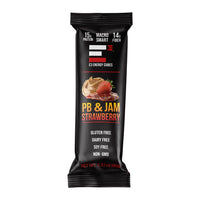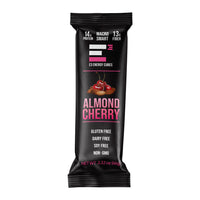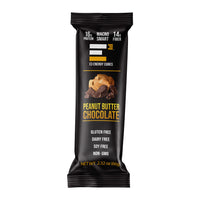Can Kids Have Protein Bars?
Protein is an elemental nutrient for growing children, playing a vital role in their development. It helps muscle growth, improve immune function, and overall health. However, ensuring kids get adequate protein can be challenging, especially with busy schedules and picky eaters. As a convenient alternative, protein bars are popular among parents seeking to provide their children with a quick and nutritious snack. These bars offer a portable and often tasty solution to meet kids' nutritional needs, but it's important to consider whether they suit young ones.
What Are Protein Bars?
Protein bars are snack-sized bars designed to provide significant protein and other nutrients. Typically, they contain protein sources such as whey, soy, or pea protein combined with various ingredients like nuts, seeds, grains, and sweeteners. These bars come in multiple flavors and formulations, catering to different dietary needs, such as gluten-free, low-carb, or vegan options.
Why Might Kids Need Protein?

Protein is crucial for children as it supports their growth and development. During the formative years, adequate protein intake is necessary for building and repairing tissues, essential for muscle development and overall physical growth. Additionally, protein plays can produce enzymes and hormones, which affect numerous bodily functions, including metabolism and the immune response.
Kids engage in various physical activities, from playground games to sports, increasing their protein requirements to support muscle recovery and energy needs. Moreover, protein helps keep children feeling full and satisfied, making it an essential component of a balanced diet for healthy weight management.
If you're looking for soy-free protein bars for kids, there are plenty of options that provide clean and wholesome nutrition.
Benefits of Protein Bars for Kids
Protein bars offer several benefits for children, making them a practical choice for parents seeking nutritious snack options. One of the primary advantages is their convenience. Protein bars are easy to pack and carry, making them suitable for school lunches, after-school activities, or family outings.

Another significant benefit is their nutritional content. Many high-protein bars provide a balanced mix of protein, carbohydrates, fats, vitamins, and minerals, supporting a child's energy levels throughout the day.
For picky eaters, protein-rich snacks can ensure they receive essential nutrients they might otherwise miss. Additionally, the protein and fiber content in many bars helps keep kids full and satisfied, reducing unhealthy snacking.
Potential Risks and Concerns
While protein bars can be nutrient-dense, there are potential concerns. Some bars contain high levels of added sugars, artificial sweeteners, and unhealthy fats, which can lead to poor dietary habits. Reading ingredient labels and choosing natural protein bars can help parents select wholesome options.
Another concern is overconsumption of protein. While protein is essential, too much protein can strain a child's kidneys and displace other vital nutrients.
Some bars may contain common allergens such as nuts, gluten, dairy, or soy, posing risks for children with food allergies. If your child has sensitivities, look for allergen-free protein bars.
Choosing the Right Protein Bar for Kids
When selecting a protein bar for children, consider the following factors:
- Nutritional Content: Look for a balanced mix of protein, fiber, and healthy fats with minimal added sugars.
- Ingredient Quality: Choose bars made with natural ingredients like nuts, seeds, whole grains, and dried fruits rather than artificial additives.
- Caloric Content: Ensure the bar fits your child's dietary needs without excess calories.
- Allergen Considerations: Check for potential allergens and opt for gluten-free or dairy-free options if necessary.
How Much Protein Do Kids Need?
Children’s protein requirements vary based on age and activity level:
- Toddlers (1-3 years) – 13 grams per day
- Young children (4-8 years) – 19 grams per day
- Pre-teens (9-13 years) – 34 grams per day
- Teen boys (14-18 years) – 52 grams per day
- Teen girls (14-18 years) – 46 grams per day
If your child is highly active, they may require more high-protein snacks to support muscle growth and energy levels.
Alternatives to Protein Bars

While protein bars are convenient, you can also include healthy whole-food snacks like:
- Greek yogurt
- Cheese sticks
- Hard-boiled eggs
- Almonds and chia seeds
- Hummus with veggie sticks
- Quinoa and legumes
These natural protein sources provide balanced nutrition without processed additives.
Tips for Introducing Protein Bars to Kids
Introducing protein bars to children can be a smooth process with the right approach. Here are five tips to help you integrate these nutritious snacks into your diet effectively:
Start with Familiar Flavors
Choose protein bars with flavors your child already enjoys, such as chocolate, peanut butter, or berry. This familiarity can make the new snack more appealing and increase the likelihood of acceptance.
Check for Allergens and Dietary Needs
Ensure the protein bar is free from allergens that could affect your child. Look for bars that cater to specific dietary needs, whether gluten-free, dairy-free, or nut-free, to ensure safety and comfort.
Introduce Gradually
Begin by offering small portions of the protein bar as a snack or meal. Gradually increase portion size as they become more accustomed to the new food. This gradual introduction can help them get used to the taste and texture without feeling overwhelmed.
Make It Fun
Present protein bars in a fun and engaging way. Cut them into bite-sized pieces or pair them with other favorite snacks. Involving your child in the selection process can induce excitement and ownership over their new snack.
Set a Positive Example
Children often emulate their parents' eating habits. Enjoy protein bars yourself and show enthusiasm for them. Sharing a protein bar as a family can create positive associations and encourage your child to try them.
FAQs
1. Can protein bars replace meals for kids?
No, protein bars should be used as snacks or supplements, not as meal replacements. Whole foods should be the primary nutrition source.
2. What type of protein bar is best for children?
Look for natural protein bars with low sugar, healthy fats, and quality protein sources like whey, pea, or nut-based proteins.
3. Are protein bars essential for kids?
No, but high-protein snacks can help active kids or picky eaters get enough protein.
4. Are protein bars good for lunchboxes?
Yes! Healthy snack bars are great lunchbox additions but should be paired with other nutritious foods.
Wrapping Up
Protein bars can benefit a child's diet when chosen carefully and consumed in moderation. They are convenient and nutritious options for busy families and active children. However, it's essential to prioritize whole foods and maintain a balanced diet. Parents can make informed decisions about including protein bars in their child's routine by considering the nutritional content, ingredient quality, and potential allergens.
Check out the variety of protein bars at E3 Energy Cubes, suitable for all ages, and find the perfect option to support your family's nutritional needs. Visit E3 Energy Cubes today!







Leave a comment